The 20 Best Punk Albums of 2019
Photo by Marcus Maddox
Punk is one of the most essential genres of our time. It’s one of the few arenas where people can truly vent, lose themselves and celebrate the fringes of society with like-minded people. Anyone claiming that punk’s been dead for years—or decades even—obviously hasn’t been to a basement club, DIY house or hometown dive bar. Whether today’s punk bands are embracing the experimental, the angsty, the ramshackle, the political or some combination of all four, these groups are essential to today’s music landscape. Listeners who feel alienated need punk more than ever, and luckily there’s plenty of bands up for the task. Scroll down for 20 of our favorite punk albums from 2019, as voted on by the Paste staff.
Listen to our Best Punk Albums of 2019 playlist on Spotify right here.
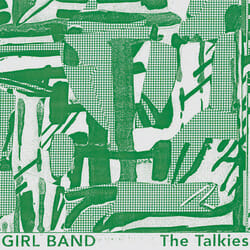 20. Girl Band: The Talkies
20. Girl Band: The Talkies
Cecil Day-Lewis, poet and father of the eccentric actor you are definitely familiar with, wrote a poem about Ballintubbert House, the Irish country manor where he was born in 1904. Over a century later, Dublin noise rockers Girl Band took over the space to birth their sophomore LP, The Talkies. “In many ways the idea behind the album was to make an audio representation of the house,” guitarist Alan Duggan explains. More than anything, though, their newest music speaks to a state of mind, one that’s quite pervasive these days: an apocalyptic anxiety, a dread that seeps into your bloodstream and quickens your heartbeat. Their acclaimed debut Holding Hands with Jamie was largely derived from vocalist Dara Kiely’s own mental health, including a post-breakup psychotic episode. Around that time, the group cancelled tour dates for their first LP due to health issues. Now they’ve returned, and are ready to revisit the gray matter floating between our ears. Perhaps this album is called The Talkies because in comparison, all other music may as well be from the silent film era. Unlike black midi, Girl Band isn’t trying to put on airs. Their noise rock is arguably more accessible, a term often used pejoratively but meant as positively as possible here. The Irish group have distilled their music into what noise rock is about at its core: waves of sound that convey emotion effectively, and lyrics that feel at once indecipherable and evocative. There’s little noodling here, which isn’t to say that The Talkies is stripped down, but rather, Girl Band trims the fat where other bands fail to. —Clare Martin
 19. Patio: Essentials
19. Patio: Essentials
All 27 minutes of Patio’s debut album Essentials are artful and purposeful. This Brooklyn three-piece—Alice Suh, Lindsey-Paige McCloy and Loren DiBlasi—aren’t the most adroit post-punk band going today, but what they create out of sparse sounds is impressive. The satisfying contrast between DiBlasi’s pointed deadpan and McCloy’s soft vocalizing is just one reason for their intrigue. The vocal interplay between DiBlasi and McCloy on “Boy Scout” is the best example, and it also displays the full range of their lyrical charm. Lines flicker between self-deprecating or violent to wry or just plain sad. DiBlasi sings, “I just feel like I always lose / I think I’m going to go home and listen to Washer / Instead of spending any more time with you.” McCloy’s delicate vocal harmonies on “End Game” are welcome pillows of melodic pop, and DiBlasi’s punky, disconsolate grandeur on “Open” struts slowly with grace. —Lizzie Manno
Disclaimer: Loren DiBlasi is a former Paste editor.
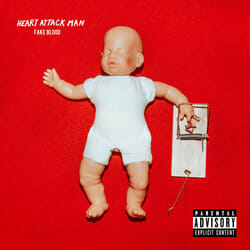 18. Heart Attack Man: Fake Blood
18. Heart Attack Man: Fake Blood
Emo-adjacent indie-punk bands are having a moment right now, and Heart Attack Man are undeniably part of that. The Cleveland band’s second album, Fake Blood, dips into college rock, grunge, punk and power pop, but all you’ll be thinking about are their seething riffs and incisive hooks that leave it all out on the field. Their pumping melodies bleed profusely while their slower riffs are satisfyingly sedating. Throughout their eleven tracks, frontman Eric Egan uses lurid physical anguish as a metaphor for emotional agony. On “Cut My Losses,” they “paint the walls with your brain,” on “Blood Blister,” there’s talk of “dead skin and phantom limb memories,” and on “Rats in a Bucket,” they have “a corpse’s worth of bones to pick.” On one hand, Heart Attack Man embraces an us-against-the-world mentality with steam emanating from their nostrils, but they also have a self-destructive side which exposes them to friendly fire. This dichotomy is illustrated in the final track, “The Choking Game,” where their invincibility and insecurities meet (“Some days I walk on water / Some days I run on fumes”). If bloodthirsty angst and strapping power punk is your scene, go out and buy some Fake Blood. —Lizzie Manno
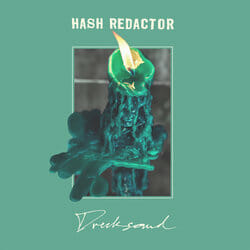 17. Hash Redactor: Drecksound
17. Hash Redactor: Drecksound
A lot of modern bands seem to forget that post-punk can be really funny. Hash Redactor’s Drecksound might sound like a heavy, intimidating bear of a record, but it has some of the most sharply sardonic lyrics I’ve heard in years. Alec McEntyre’s sneering vocals resemble Mark E. Smith more than a little, which is good timing, because the world’s got an opening for a Mark E. Smith for the first time in about 42 years. There’s some almost free jazz-sounding guitar splatter between McEntyre and George Williford, and the rhythm section made up of Nots’ Charlotte Watson and Meredith Lones powers through the murk and keeps everything on track. It’s a hell of a debut from this Memphis punk supergroup. —Garrett Martin
 16. Greys: Age Hasn’t Spoiled You
16. Greys: Age Hasn’t Spoiled You
“We wanted to push as far away from what our perception of a ‘rock band’ could be while still retaining certain characteristics that sound like Greys,” says frontman Shehzaad Jiwani. The Toronto four-piece decided to try their hand at shape-shifting on their third album Age Hasn’t Spoiled You, and the risk paid dividends. It’s a dense listen that draws on everything from punk, noise and psych-pop to jazz, trip-hop and industrial. They sneak in unconventional influences in a way that doesn’t seem disjointed or immediately jarring. There’s a magnetic sprawl to this album, and each musical tangent is a new, charming landscape along a picturesque, spontaneous drive to nowhere in particular. Though that’s not to say this album is directionless. The driving seven-minute centerpiece, “Aphantasia,” holds the album together and seamlessly swings like a pendulum from one idea to the next. Maybe it’s obtuse to include a genre-defying album like this in a genre-specific list, but if the point of punk is to push boundaries and question conventional wisdom, then Age Hasn’t Spoiled You seems like a noble inclusion. Greys traverse new frontiers, and those frontiers possess a tenebrosity and musical guile that make this album an immensely stimulating one. —Lizzie Manno
 15. Deliluh: Beneath the Floors
15. Deliluh: Beneath the Floors
One of punk’s unspoken rules is that it isn’t supposed to sound graceful, but Deliluh skirt that norm. The Toronto band channels dark realism through thoughtfully-crafted storytelling, and their songs hum like the slow churn of a hard day’s work. You can listen to this record with the same awe and desolation you might feel when you stare at a colony of ants—there’s harmony and simplicity to it all, but dig deeper, and you’ll uncover a strict framework that’s hostile to stragglers and nonconformists. Deliluh accent narratives of bleak monotony with minimal post-punk, underpinned by Kyle Knapp’s spoken and whispered ruminations. Deliluh’s tendencies may lean experimental, but their rusted industrial imagery captures the dystopia that we’re hurtling towards—whether internal or external. —Lizzie Manno
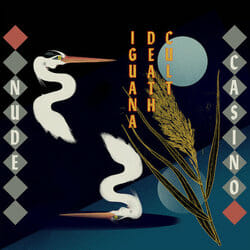 14. Iguana Death Cult: Nude Casino
14. Iguana Death Cult: Nude Casino
Dutch five-piece Iguana Death Cult have returned with even more hopped-up absurdity than before. Their new album Nude Casino, which follows their 2017 self-released debut album The First Stirrings of Hideous Insect Life, is a quest to wriggle out of life’s bitter clutches with the maximum possible levels of fun and debauchery. While their debut mixed speedy garage punk with steady psych and adroit post-punk, Nude Casino sees them embrace their funkier side—they even dip their toes into New Wave and disco. “Carnal Beat Machine” is a disco punk number for the ages, and “Half Frysian” is a krautrock meets Talking Heads ripper—musically saucy and lyrically anxious. While the album masquerades as a dancefloor filler and moshpit starter, their lyrics are bursting at the seams. Frontman Jeroen Reek presents himself as a neurotic mess, and Nude Casino is his wide array of responses to such neuroses—total breakdown, wild nights out, wacky dreams, seclusion and even imagining himself in liquid form. Nude Casino may be full of surreal imagery, but the album’s mercurial happenings couldn’t be more realistic. —Lizzie Manno
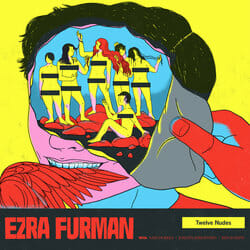 13. Ezra Furman: Twelve Nudes
13. Ezra Furman: Twelve Nudes
Like a lot of people, Ezra Furman has been alarmed by the “broken world,” as he calls it, that has emerged over the past few years. It shows in his music. Though the Oakland singer has long channeled his disaffection into his songs, he’s never done it with as much immediacy as on Twelve Nudes. Furman’s latest is the rapid-fire follow-up to his 2018 album, Transangelic Exodus, and in many ways, it’s the jagged flip-side. Though Transangelic Exodus was also a reaction to the regressive shitstorm swirling outward from Washington D.C., the album had a certain polish. By contrast, Twelve Nudes has a punk edge that is chaotic and raw, made in a hurry with a first-thought, best-thought sensibility that sprays psychic shrapnel in every direction. It’s also catchy as hell. He uses humor as a cover while exploring his gender fluidity on “I Wanna Be Your Girlfriend,” a slower song with a torchy vibe. Instead of following the example of his responsible friends seeking jobs, or his intellectual friends seeking truth, Furman is attempting to lure a love interest, leering ever so slightly as he promises to blow his hetero-leaning crush’s, er, mind if he can overlook Furman’s “less than ideal” physical characteristics. It’s a brash come-on from a singer with enough confidence to say what’s on his mind, and the talent to express it in songs you want to listen to over and over. Twelve Nudes is loud, sometimes sarcastic, often pointed and invariably entertaining. The album is the work of an artist with a keen sense of his own capabilities, and it’s a fitting soundtrack to a world in turmoil. —Eric R. Danton
 12. Behavior: Spirits and Embellishments
12. Behavior: Spirits and Embellishments
Los Angeles trio Behavior represents the grandiose wing of punk. Their third album Spirits and Embellishments experiments with peculiar time signatures and philosophical musings, but it feels bigger than punk—sometimes tapping into pop’s melodies and other times embracing the mercurial nature of jazz. The band’s three members wrote the lyrics together on a shared document, resulting in a record of stark mantras rather than clear-cut stories. It’s a record of gripping tension and unbearable restlessness, orchestrated by their slow crawling vocal delivery. Rather than shouting from the hilltops, Behavior unearth a pain that’s even more visceral—the kind that bubbles below the surface, away from plain sight and prone to explosion at any moment. One reason they’re so hard to contain is the off-kilter beat of drummer Evan Burrows (also of Wand) who dictates their snaking songs just as much—if not more—than the other members. What appears melancholy and understated at first often morphs into beauty and indulgence. They’re unsettling, but not in the ways that punk typically is. Both lyrically and musically, Behavior excel at building vast constructions that are swiftly knocked down. —Lizzie Manno
 11. Otoboke Beaver: Itekoma Hits
11. Otoboke Beaver: Itekoma Hits
Kyoto, Japan’s Otoboke Beaver are top contenders for the most technically impressive punk album of 2019. Their second album Itekoma Hits is filled with the sound of debaucherous camaraderie and pulverizing instrumental thrash. With vocals that range from playful twee-pop to threatening shouts, Otoboke Beaver laugh gleefully as they take turns swinging baseball bats at car windows. This isn’t three-chord punk from your parents’ garage—this is high level musicianship with slippery tempos and a relatively high barrier to entry, but tapping into their frisky grooves and arty punk racket is more than worth a try. The only question is whether you can keep up with them. However, riding their coattails is still a great place to be. —Lizzie Manno
 10. Parsnip: When the Tree Bears Fruit
10. Parsnip: When the Tree Bears Fruit
You might’ve been able to guess that a band from Australia called Parsnip was whimsical in nature, just based on their root vegetable namesake, but they’re far more than just a jolly punk band. Their debut album When the Tree Bears Fruit is full of pop ditties, sure, but there’s deep meaning to be mined from their jaunty, multi-chromatic songs. It’s about revelling in life’s lighter, dreamier sides—the kind that filled our childhood with imaginative wonder and starry-eyed purity. Remember those ideas that spawned cardboard box spaceships, ten-story-high sandcastles and witchy potions made from various liquids in your bathroom cabinet? Parsnip will remind you. It’s not a childish record by any means, but their shared vocals and frolicsome keyboards will allow you to temporarily snap out of whatever cynicism or nihilism that’s currently plaguing you. —Lizzie Manno
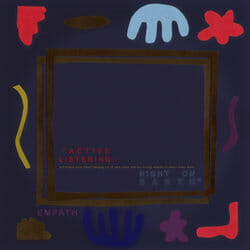 9. Empath: Active Listening: Night on Earth
9. Empath: Active Listening: Night on Earth
Philadelphia four-piece Empath aren’t your everyday noise-pop band. They masterfully and curiously juggle bubblegum pop sweetness, ear-splitting noise guitar tornadoes, off-kilter synths and ambient nature sound effects. On last year’s cassette EP Liberating Guilt and Fear (which made Paste’s list of the 10 Best EPs of 2018), they intentionally overwhelm with discordant noise-punk rumbling, charm with tuneful pop melodies and baffle with experimental hues. Their highly-anticipated debut album, Active Listening: Night on Earth, released on DIY label Get Better Records, is further proof that you can achieve the highest highs of pop via unconventional musical vehicles. It contains mystifying weirdo symphonies that defy all previously existing musical states of matter, and Empath are nothing if not for their ability to push sonic, musical and lyrical envelopes. The album is both a resplendent listen and an acquired taste. Not every listener will take pleasure in the band’s blustery dissonance, but those who do will be rewarded with dense pop riches and deeply poignant, poetic lyrics. —Lizzie Manno
 8. Kim Gordon: No Home Record
8. Kim Gordon: No Home Record
Kim Gordon doesn’t put much stock in the superlatives that have piled up around her over the years: pioneer, visionary, icon, legend, beacon. “Being referred to as an ‘icon,’ blah blah blah,” she said recently in the New York Times. “What does that even mean?” Fair enough, but you’d be forgiven for thinking she’s earned it. As a visual artist, co-founder of Sonic Youth, fashion designer and occasional actor, Gordon has been a magnetic, and inscrutable, focal point of indie cool for nearly 40 years. In all that time, her musical pursuits have come in group projects: 15 studio albums with Sonic Youth, three each as part of Free Kitten and Body/Head and one with Glitterbust, along with various EPs and singles scattered among them. Now, at the age of 66, Gordon steps out with No Home Record, a ferocious solo debut. It’s jagged, chaotic and mesmerizing in a way that pulls you inevitably into the thick of it, as if the songs were exerting their own inescapable gravity. Gordon tinkers throughout with rhythms, intoning short, incisive lyrical phrases over a hypnotic mechanical beat on “Cookie Butter,” and letting the electro-clash drums on “Sketch Artist” drop out here and there for free-form interludes. Toward the end of No Home Record, she skips the beat altogether on “Earthquake,” singing in dusky tones over drifting guitars, crescendos of cymbal wash and some crumbly electronic noise in the background. —Eric R. Danton
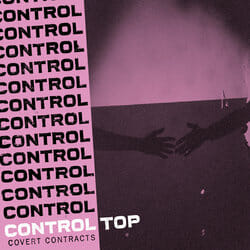 7. Control Top: Covert Contracts
7. Control Top: Covert Contracts
The debut album from Philadelphia three-piece Control Top marries shrewd pop melodies, writhing punk guitars and Ali Carter’s wide-eyed roar. Covert Contracts is brazen in its nonconformity, but if you’re looking for a band to fight the machine simply to score woke points or to project some hollow call for unity, this isn’t your band. Control Top cut through the bullshit without beating a dead horse or reaching for low hanging fruit. Ali Carter’s qualms run much deeper than the current presidential farce—it’s about tearing down power structures and deflating egos wherever they exist. With Covert Contracts, Control Top are always on the prowl—there’s a defiance and sinister slither to everything they do. Even if you removed the biting societal and interpersonal skewerings in their lyrics, their explosive punk fits still stand tall. Songs like “Type A” and “Chain Reaction” contain just enough guitar bluster and drum thrash to bolster their hooky riffs, and Carter’s vocals are simultaneously euphonious and strident. —Lizzie Manno
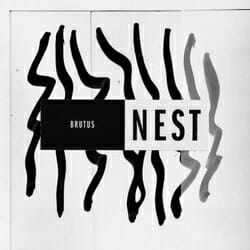 6. Brutus: Nest
6. Brutus: Nest
It might be a stretch to call the second album from Belgian trio Brutus “punk,” but their melodic rock doesn’t seem separate from the punk ethos, either. Their conscientiously constructed rock is filtered through punk, black metal, post-rock and post-hardcore lenses, and it’s centered on the sometimes cutthroat, sometimes crushingly beautiful lead vocals of Stefanie Mannaerts. Mannaerts, also the drummer, didn’t plan on being the band’s lead singer, which makes her jaw-dropping vocals on their new album Nest all the more perplexing. Now fully embracing her dual role, Mannaerts has more than proven her versatile vocal chops—channelling the badass yowl of Kathleen Hanna, the majestic aura of Dolores O’Riordan and the mystical wisp of Elizabeth Fraser. Its collision of the tender and the abrasive is what makes Brutus’ Nest so succulent. When Mannaerts’ voice opts for ephemeral softness, the drums and guitars often show their teeth, almost in a motherlike, protective fashion, and when Mannaerts reaches for the cutting roars, the instrumentals subside for a more chilled backing. The album’s lyrics address their struggle to maintain a healthy connection with those at home, and they cradle their loved ones with the same attentiveness and affection as they do with their insanely brisk drumming, ear-splitting guitars and Mannaerts’ larger-than-life vocals. —Lizzie Manno
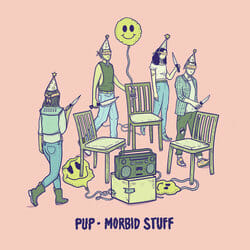 5. PUP: Morbid Stuff
5. PUP: Morbid Stuff
Toronto’s PUP unleashed their third album, Morbid Stuff, on their own Little Dipper label, and it contains some of their loftiest melodic payoffs yet. The album was produced, recorded and mixed by Dave Schiffman (Weezer, The Mars Volta), and it makes for their most pristine recording to date. Morbid Stuff is at the crossroads of enlivening joy and debilitating self-hatred. Songs like “Kids” and “Free at Last” overflow with angsty lyrics of anxiety, heartbreak and fierce self-put-downs, but their reassuring pop-punk riffs and refrains will scoop you up and bring you back to your senses. The collision of utter bleakness and youthful exuberance that characterizes this record also manifests itself on the album cover—four people are playing musical chairs with knives in hand, party hats and blindfolds. The boldest cut is the post-hardcore rager “Full Blown Meltdown,” which sounds like just that. Stefan Babcock sounds like he’s foaming at the mouth when he sings, “I’m still a loser and always will be / So why change now?” The album tracks Babcock’s struggle with depression, and though there are many forlorn moments on this LP, PUP channel their pain into a catchy punk album that’s about as fun as any record you’ll hear this year. —Lizzie Manno
 4. Oso Oso: Basking in the Glow
4. Oso Oso: Basking in the Glow
Why did Jade Lilitri, the Long Island, New Yorker behind one-man wonder-band Oso Oso, play and sing the chorus of his song “dig” only once during its four-and-a-half-minute running time? To understand the question, you have to appreciate the magnificence of that chorus. It comes in the middle of “dig,” bookended on the front end by a couple minutes of enjoyable pop-rock that bumps along like Pinback and on the back end by a coda that crescendos nicely, but ultimately feels unnecessary. In between is 34 glorious seconds in which the song opens up and turns its face toward the sun, bringing together peach-fuzz distortion, a reliable chord progression, a blanket of cymbals and Lilitri’s soaring vocals. “I’m still reeling from the mess I made,” he sings, as if rediscovering reality after two verses of cautious optimism. The combination of contrasting sounds and catchy melody is the stuff goosebumps are made of. Why Lilitri didn’t use such a glorious chunk of music elsewhere in the song—say, after the first verse or repeated a couple times at the end—is anyone’s guess. But it only takes a few listens to Oso Oso’s new album, basking in the glow, to recognize that questioning the guy’s songwriting decisions is an exercise in diminishing returns. He is, it seems, incapable of writing a bad tune, at least at this point in his career. —Ben Salmon
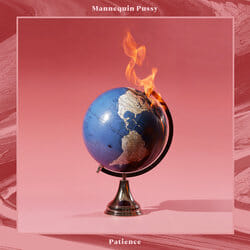 3. Mannequin Pussy: Patience
3. Mannequin Pussy: Patience
Mannequin Pussy’s first two albums—2014’s GP and 2016’s Romantic—are both under 20 minutes and feature speedy jolts of punk along with the occasional glimmer of dulcet-toned pop. But their 2019 LP, Patience, is crisper, poppier, longer and more fully realized than anything they’ve released before. In a still-modest 26 minutes, Mannequin Pussy, led by frontwoman Marisa Dabice, dish out punk-pop that will make you want to hug your teenage self, but also fight on behalf of the adult you’ve become. Dabice opened up on this record in a way she hasn’t before. She sings about abusive relationships, self-hatred, and personal inadequacies, revelations she struggled with for years before ever talking about them. It’s a record that simultaneously pierces while forcefully standing its ground, rightfully taking up space. Patience begins with anxious heart racing, but concludes with the kind of heart racing we all strive for—that lovey dovey tingle you wish you could bottle and save for when you’re feeling cynical. Dabice, along with Colins Rey Regisford (bass, samples, vocals), Kaleen Reading (drums, percussion), and Thanasi Paul (guitar, keys) also made one of 2019’s most anthemic tracks in the form of lead single “Drunk II.” When Dabice forcefully, begrudingly admits, “I still love you, you stupid fuck,” you can already envision a crowd of forlorn fans belting that line in a basement venue on a Tuesday like they have nothing to lose. Dabice’s admission of not only subtle imperfections, but also deep-set, recurring inner turmoils, is immensely invigorating. Patience is the sound of liberation, and paired with melodic riffs that scream into the void just like Dabice, it’s also an emotional reboot you can rage to. —Lizzie Manno
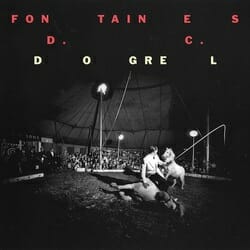 2. Fontaines D.C.: Dogrel
2. Fontaines D.C.: Dogrel
Fontaines D.C. have been pigeonholed as the British Isles’ next great post-punk export à la Shame or Idles, but this Irish five-piece deserve more than that reductive framing. Fontaines D.C. are more poetic than the bands they’re lumped in with, and their debut album Dogrel is a testament to a different set of concerns. Dogrel takes on the degradation of urban cities as lively cultural hubs and launching pads for people to make something of themselves—or at least put some change in their pockets. Frontman Grian Chatten and his bandmates share a love of literature and poetry (the Beats, James Joyce, Patrick Kavanagh, etc.), and they write songs together in Irish pubs, resulting in a brazen-faced, romantic portrait of Dublin and its vast characters. Two of their biggest calling cards are self-belief and authenticity. The uplifting lyrical themes on the lead track “Big” (“My childhood was small / But I’m gonna be big”) are analogous to “Rock ‘n’ Roll Star,” the lead track on Oasis’ Definitely Maybe, though “Big” has more wit and spit. If self-awareness is one factor of the renewed interest in post-punk, the intense, charismatic Chatten certainly has it as he pokes fun at charisma (“Charisma is exquisite manipulation”). Dogrel is an album of tremendous ardor and vivid landscapes, and interspersed with an Irish underdog spirit, Fontaines D.C. are nearly untouchable. —Lizzie Manno
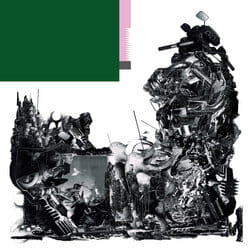 1. black midi: Schlagenheim
1. black midi: Schlagenheim
It may be hard to write about, but Schlagenheim is a record you feel more so than anything else. Case in point: First track “953” features one of the hardest hitting lead guitar riffs in recent memory, an opening salvo that makes you want to drop everything and go run a mile—something I actually did, resulting in my fastest time ever. Within mere seconds of hitting play on their debut album, Geordie Greep and Matt Kwasniewski-Kelvin make their case as two of our most inventive contemporary guitarists, all while you try your hardest to keep time with a beat that will still elude you after 10 listens. There’s a high barrier to entry for Schlagenheim, a record by a band who refuses to meet you halfway. Pedantic and pretentious all the way through, Schlagenheim showcases why black midi are generationally great instrumentalists despite our inability to follow what they’re doing and why. By the end of “Ducter’s” anarchic pandemonium, you won’t know what hit you, but you’ll find yourself quickly returning to “953” for another go around of an album that showcases some of the most talented musicians around, coalescing behind an experimental, genre-less and extremely noisy sound to exceptional results. Schlagenheim is beyond weird. Schlagenheim is a legitimate one of a kind record. Schlagenheim is a masterpiece. —Steven Edelstone
Listen to our Best Punk Albums of 2019 playlist on Spotify right here.







































